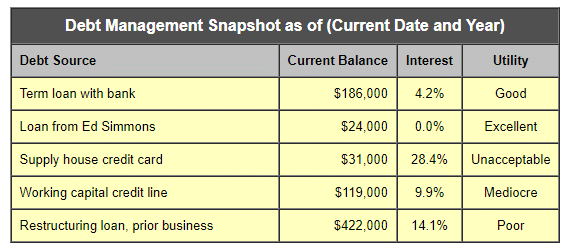Creating a formal debt management plan, rather than borrowing haphazardly, can save your firm thousands or even tens of thousands of dollars in interest.
Following certain best practices and using a structured approach to your company’s debt plan is part of an effective construction finance, accounting and tax strategy. First, create a table that lists all current debt, including working capital lines of credit, loans of any kind, any interest bearing notes or other financial obligations. Don’t include Accounts Payable.
If you look at the rates of interest you are paying on your different notes, credit cards, and loans and rate them according to current benchmarks you will likely find room for improvement.
The High Cost of Working Cap Utilization
One of the most common debt instruments construction firms use is the working capital revolving line of credit. The biggest mistake some firms make is to use most of the credit line immediately and then keep utilization high.
Think of it this way. A term loan usually starts with a high balance, and then as your firm pays principal and interest, the loan balance shrinks. Consequently, interest is steadily being charged on less and less of a loan balance as time goes on.
With working capital lines of credit, however, maintaining high balances in the false belief that this provides better access to cash is essentially paying interest on a high-balance loan balance that never goes down, never gets paid off and never goes away.
A Better Way
All borrowing is more efficient and carries less cost of interest when the use of the funds and the payment terms are predetermined. Planning use of debt is important if your firm has access to loans and other forms of borrowing because individuals responsible for debt decisions may be too free with credit and borrowings.
On the other hand, if your firm is hard pressed to get loans and is awarded one, staying true to its purpose ensures the purpose of the borrowing is actually met.
All debt should be used in a purpose-driven manner. Take as an example a mortgage. You borrow a sum of money whose sole purpose is to buy a specific piece of real estate property. Lines of credit and credit cards should be used in the same fashion.
Give credit cards to project managers for use only on particular projects, or with particular vendors who don’t offer credit terms, or only for gas charges. Tell cardholders they have to justify why they choose to use credit over more conventional terms of payment.
The reason you want to limit the careless use of credit is to avoid interest charges. Be certain your managers are aware that interest is not charged by, among others:
- Vendors that extend credit;
- Cash-on-delivery (COD) material drops, and
- Gas stations that take cash for fuel.
Ask yourself and your managers if a credit card or working capital draw is so attractive that it’s worth cutting a chunk of your capital for the convenience. Whose convenience is met when a project manager makes a split-second decision to charge a $2,000 material drop from a vendor where you have a house account because the credit card was in his or her wallet and the manager wasn’t sure the firm had that much house credit available.
Once you have set the precedent, managers will find it easy to maintain their interest-saving habit. As well, your interest expense will drop down so low that you’ll feel it in your bank account balances.
Consult with your accounting and tax advisers to help structure a formal debt management plan for your company. It could save you a bundle in interest. Also, ask your accounting and tax advisers to verify the market rates of interest on your different debt instruments. Knowing what you should be paying as a standard rate of interest will help you start your debt management plan.
Contact Tom Bailey via our online contact form for more information.
Councilor, Buchanan & Mitchell (CBM) is a professional services firm delivering tax, accounting and business advisory expertise throughout the Mid-Atlantic region from offices in Bethesda, MD and Washington, DC.





